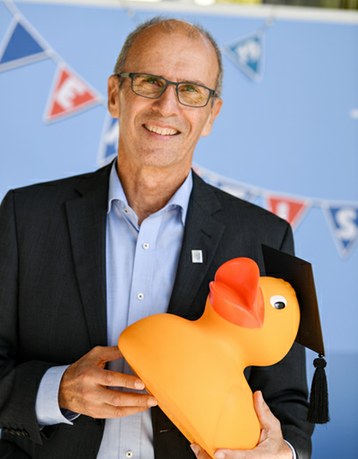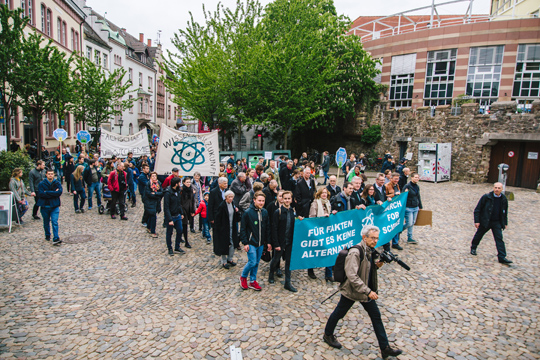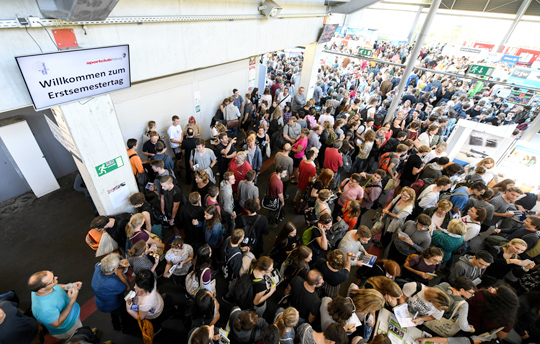Open, campus!
Freiburg, Mar 01, 2019
Few people know the University of Freiburg like Rudolf-Werner Dreier - and not only because he wrote a book about its history. As head of Public Relations, he informed the world about the university’s ups and downs, he helped mold its image as a modern, cosmopolitan institution and ensured that this place of high, low, sharp and varied notes spoke with one voice. For his success in establishing alumni groups in Germany, Rector Hans-Jochen Schiewer awarded him the University Medal. He retired at the end of February 2019. In an interview with Rimma Gerenstein, the head of Public Relations explains how he developed the university communication strategy, what the current challenges are, and the new ways he wants to go when he is retired.

Heart and soul: Rudolf-Werner Dreier poses with the University of Freiburg mascot on new students’ day. Photo: Patrick Seeger
“Imagine the elevator door opens and the University of Freiburg comes out. Who do you see?” Over the years, many people have asked that question. I’m curious to know who you see behind the elevator doors.
Rudolf-Werner Dreier It’s not easy to sum it all up with just one image. Over the years, that one person has changed many times - just as the university itself has. In 2019, for instance, I see an assistant professor with tenure track. She is a tough individual, yet she values working and teaching at a university with a long history and traditions.
You took over as head of the press office in 1983. What memories do you have of that time?
I came across 150 institutes, all professorial fiefs, connected by nothing but central heating. Even the Ministry in Stuttgart thought the university was pompous, expecting to be praised and pampered. Back then, the press office was just me and a secretary - and her job until then had been to track down potentially revolutionary voices on campus and report them to the Executive Vice-President. She went to the student cafeteria at lunchtime and collected all the pamphlets. I quickly changed that, and I turned the university bulletin, which was seen as the executives’ propaganda sheet - it was called the "yellow plague” - into a real vehicle for information which focused on the university as a whole.
When was the big change in university culture?
In the early 1990s. The establishment of the Faculty of Engineering was very important - it heralded the era of interdisciplinary co-operation among Freiburg researchers. They looked beyond their own subjects and developed new ideas with related disciplines. And I spent 26 years developing the communications section for the Freiburg Medical Center, thereby expressing the unity of the university and its hospitals to the outside world.
The university today is much more interconnected, and that is a good thing. In addition to the conventional faculties as the pillars of the university, many interdisciplinary research centers have been established. The fact that this was implemented in Freiburg at an early stage is a key reason for our success in national and international competition. Our current motto, Connecting Creative Minds, is an excellent description of the internal, interdisciplinary spirit of our university.

The university is an integral part of the city: In 2017 students and graduates organized the Freiburg March for Science – it became the second-biggest of these demonstrations in Germany. Photo: Sandra Meyndt
You also changed the relationship between the university and the town.
From the very beginning it was important to me to make the university an integral part of the city - after all, it was the largest employer in the region even then. I wanted it to be a place which was open to encounters and discussion, a young, dynamic, colorful institution which regarded itself not just as a purely regional, but also as an international university. But this was only possible with the support of the many outstanding rectors who always supported me. Communication is always a job for management, and public relations at the university is no different. I got the support I needed from all the rectors, including and especially from Professor Hans-Jochen Schiewer over the past ten years. This has enabled me to develop many new formats for German universities. For instance, every summer we invited the people of the town to the Rector's Ball; on the first day of semester we welcomed new students and their parents and showed them around the university; every year we held the two-week-long “University Days” event in the region - at which researchers gave lectures on topics as diverse as medicine, carnival customs, regional history and dialect research. And at the very latest, the university has had a firm place in the minds of the people in Freiburg since the university’s 550th anniversary. And everyone who comes to visit us sees the sign saying “University city Freiburg” on the main roads into town. I fought for two years to get those.
When you look back at the past decades - what were the most drastic changes in press relations work and its counterpart, journalism?
Once upon a time we sent out press releases by mail or by fax, and I did the layout for the first Uni newspaper myself on the computer with the standard tools available. Digital communication changed all that. Once, we relied on the media to spread our news. Today we reach our various target audiences - whether the press, the students, or the people of Freiburg - directly using our different formats. That means we now tailor our product to the final customer. And the media landscape has become very diverse. We have to package our message for the various media - a TV broadcaster, for example, needs good pictures to draw attention to a particular research topic. And the role of the media as a counterbalance to public relations is disappearing. University public relations offices will have to step up their internal quality management. That’s not easy. How are the press people to determine whether a study really is as groundbreaking as researcher XY claims? But it is essential that we face these challenges. Because trust is the greatest quality which we have in the eyes of the public and in the media. We have to fight for it and set high standards for our work. But for that we have to adapt our own form of organization. We designed all our communication processes in the form of a newsroom. And so we always used the most appropriate channel to reach a certain audience, keeping those people informed and connected with the university.

New students and their families get a special opportunity to get to know the university. Including parents in the communication chain was one of the university public relations developments which started in Freiburg. Photo: Patrick Seeger
In the 1990s another key thing began - In 1996 Freiburg became the first university in Germany to introduce broad-based alumni work.
I had heard of the alumni organizations in the US, and traveled to New York, Connecticut, Chicago and San Francisco to see how the universities there, like Harvard, Yale and Berkeley carry out their alumni work. The concept I chose for Freiburg - and I was probably the first to use the term “alumni” in Germany - remained on the shelf for quite a while. It took me a few years to convince the Rectorate of its value. But even I was surprised that our former students around the world took up the alumni idea so enthusiastically and are so happy to make use of our services. Yet the advantages are clear: When a university works hard for its students - organizing celebrations for its graduates or promoting selected projects with prizes, for instance - that strengthens the bonds between the students and their alma mater. And when they are working as professionals, they will look back on their university days with pleasure - and will want to give something back. Today, we are in touch with around 150,000 alumnae and alumni around the world. In Germany and abroad, clubs invite former students to regular events, and every two years there is an international alumni meeting in Freiburg. Meanwhile, we receive 150,000 euros in donations to our Alumni Association - and in Freiburg we are the biggest providers of scholarships to the Deutschlandstipendium scheme. The alumni are our best lobby group.
Even in retirement you don’t want to leave the University of Freiburg entirely; you will be working as the business manager of the association of Alumni Freiburg e.V.. What are your plans?
The members re-elected me as business manager of the Alumni Association at the meeting of the board in July 2018. I fill this honorary post, along with the Rector, as the first chairperson and Dr. Dorothea Rüland as second chairperson. And because the office only employs one person, I will be making my contribution. The real challenge is to manage all the alumni clubs, chapters and ambassadors in the association with a very slim administration for all those tasks. But we still aim to support the establishment of more clubs as well as the work they do. And my dream is that one day the University of Freiburg will have an alumni ambassador in all the countries on earth, so that our students - wherever they later work - will have a keen, competent contact person. And there are other projects, for instance the current negotiations for book publications, and I will continue with my teaching work at the Center for Key Qualifications. I won’t be bored.

